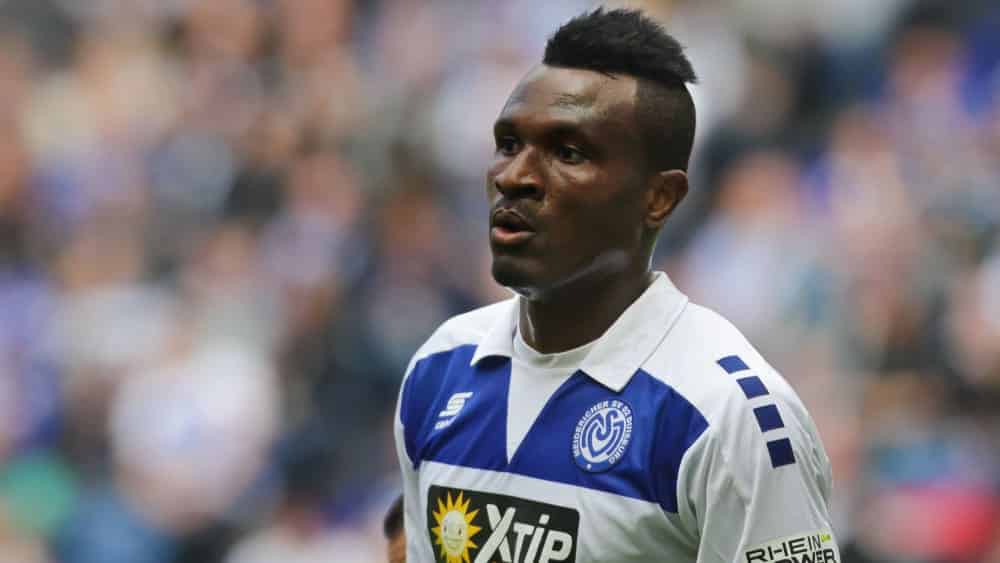China was considered a desirable destination for professional footballers. Then came the crash – and the state doctrine of football promotion no longer applied. But the case of former Fürth and Duisburg player Kingsley Onuegbu shows that there are still clubs willing to pay astonishing sums – even if the payment morale is apparently not always right.
Striker Kingsley Onuegbu, who was under contract with SC Idar-Oberstein, Eintracht Braunschweig and SV Sandhausen in Germany as well as SpVgg Greuther Fürth and MSV Duisburg, signed a contract with Qingdao Hainiu FC on 15 March 2022 that runs until 31 December 2022.
The club from the port city of Qingdao, which has a population of over six million, currently plays in the second division and won the national cup in 2002. To date, this is the club’s greatest success.
According to the contract, which was signed when he was almost 36 years old, Onuegbu was to receive a salary of 300,000 US dollars for those eight and a half months. For a professional of his age, who spent his career in Germany alternating between the 2nd and 3rd leagues, this was a pretty high fixed salary – especially since bonuses were to be paid on top of it. However, at 2,000 US dollars per goal and the same amount for a win, these were extremely low in relation to the fixed salary.
Nevertheless, compared to the average income for a player in the German lower league, which is probably the equivalent of 370,000 US dollars, the salary seems surprisingly lavish for a Chinese second division club.
China’s football shine has faded
As we all know, the great run on Chinese football, which once invested sums in European and South American stars like only Saudi Arabia does today, is long gone. In the meantime, 16 professional clubs from the Middle Kingdom went bankrupt. Didier Drogba, Paulinho, Carlos Tevez and Hulk once played there. Apart from ex-Chelsea star Oscar and Marouane Fellaini, who are both over 30, there are hardly any illustrious names left in the Chinese Super League. All the more astonishing, then, the comparatively lavish fixum that flowed at Quingdao, where Onuegbu made his way via Nea Salamina Famagusta (Cyprus) and the two recently dissolved Chinese clubs Shaanxi Chang’an Athletic and Xinjian Tianshan Leopard.
Or better: should flow.
Because on 2 June 2023, Onuegbu turned to FIFA for outstanding salary payments, which then opened proceedings. On 1 May, according to the world governing body’s file, the Nigerian-born player had already sent a reminder to Quingdao for outstanding payments of US$96,000. The club and the striker then reached an agreement. The sum was to be reduced by 10,000 US dollars and paid within five working days. A seven-day delay would have resulted in a US$5,000 penalty.
Falsification of documents?
Later – on 12 June – Onuegbu informed FIFA that he had received the US$86,000, but now demanded the balance also because of the delay. He also complained about alleged forgery of signatures: before the season, every club had to get written confirmation from every player to the league that no salary payments were outstanding. According to the file, he stated that he had not signed such a paper, but that the document nevertheless existed.
Legally, Onuegbu lost out to the club, which did not comment.
Since he had not deposited any document on the payment of the 86,000 US dollars, such as a bank statement, which would serve as proof of the delay, FIFA did not comply with the player’s complaint. According to the FIFA file, Onuegbu was also unable to provide any proof of the forgery of documents. After all, he has the outstanding 86,000 US dollars.
And he has found a new employer in Dongguan Guanlian – once again in China’s second division. At the age of 37 in the meantime.





